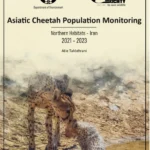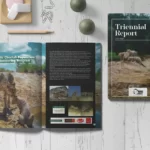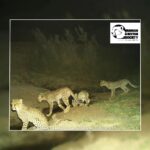An Asiatic Cheetah was spotted in the unprotected zone between Turan Biosphere Reserve and Miandasht Wildlife Refuge. The cheetah was in poor condition, panting, and had a bloody mouth. A leech was attached to the underside of its tongue. The young male cheetah, named “Tara” by the Department of Environment of Semnan in 2019, had not been seen for a long time until about 3 weeks before his death when his images were recorded after several years in our camera trap area in Touran. After the death of the cheetah and the protest of the ICS to the DoE based on suspicion about the causes of death, the DoE promised to hold a meeting to review the issue with us and independent veterinarians. The death of a young male cheetah is a serious blow to the fragile population of cheetahs in Iran. Here are all of the incidents that we heard of. Any of them may be confirmed or rejected by DoE:
- According to local reports, the cheetah had stayed in the same area for several days and could not leave. Even when the rangers arrived (Sunday morning, August 5), he remained under the trees and seemed too weak to flee.
- The images (which the Iranian Cheetah Society has and will publish with the Department of Environment’s permission) show his weakness, panting, mouth bleeding, and leech infestation.
- A veterinarian from Semnan Department came to examine him on Sunday night. On Monday morning, he was anesthetized and taken to Abbasabad station.
- His mouth and throat were full of leeches. He received serum at the anesthesia site to treat his severe anemia.
- He was moved from Abbasabad road to Miyami, towards the Cheetah Breeding Center in north Turan National Park before noon.
- No precise information is available about his transfer box and condition during the move.
- After reaching Delbar Station, he died of severe anemia and his body was sent to the Department of Environment for autopsy and investigation.
- The autopsy report and transfer operation are not yet accessible to independent reviewers.
ICS will keep following up until the issue is clear because this loss to the wild population, especially with the known decline in males, can be irreversible. Stay tuned for more news.








